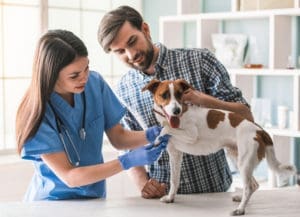 Everyone knows about the importance of safeguarding health data, and the incredible connectivity that is transforming healthcare. Hospitals and doctors’ offices are now cyber hubs dispensing medical wearables, promoting telemedicine, and building connected clinics. However, in their rush to corner the growing business in the human healthcare market, MSPs may be overlooking another opportunity: the local veterinary office.
Everyone knows about the importance of safeguarding health data, and the incredible connectivity that is transforming healthcare. Hospitals and doctors’ offices are now cyber hubs dispensing medical wearables, promoting telemedicine, and building connected clinics. However, in their rush to corner the growing business in the human healthcare market, MSPs may be overlooking another opportunity: the local veterinary office.
Vet offices feature much of the same connected technology found in human hospitals, but without the onerous HIPAA requirements. Federal law doesn’t require you to safeguard Fido’s health data. Still, there are plenty of other privacy and cybersecurity considerations to consider when taking on a vet clinic as a client.
Vets are vulnerable
Vet clinics are targeted by the same cyberattacks as any other enterprise: phishing, ransomware, trojans, and other cyber-ills. With vet clinics storing copious amounts of data like names, addresses, controlled substances and medication information, credit card, and banking information, they are susceptible to vulnerabilities.
“The threat of this sensitive data being stolen is significant, especially when veterinarians are not proactively preventing this type of threat or are not prepared to deal with the ramifications of an attack swiftly,” Lance Roasa, national president, American Veterinary Medical Law Association told the American Veterinary Medical Association Journal.
For more about the state of connectivity and cybersecurity in the veterinary medicine field, Smarter MSP reached out to Dr. Christie C. Long, DVM, Head of Veterinary Medicine at Los Angeles-based Modern Animal which aims to bring technology to the veterinary experience.
Mainline animal hospitals (cats and dogs) tend to have more connectivity than their food animal or equine animal counterparts. While many animal hospitals are still paper-based and use fax machines to communicate with labs and pharmacies, this is changing.
“The most connected hospitals use the internet to seamlessly integrate to both of those entities, as well as specialists,” details Long.
This could include radiologists for transmitting x-ray and ultrasound images; cardiologists, to transmit EKG readings; pathologists, to scan and transmit microscope slides; and even anesthesiologists, to send real-time vitals during anesthetic procedures.
However, Long states that many practices still cling to paper and fax as, “Completely connected practices are still pretty rare.”
How can MSPs serve vet centers?
As far as opportunities for MSPs go, that depends on the type of vet center. Chain-based animal hospitals have a centralized IT center with their own tech staff.
“Independent practices typically rely on someone in the practice who is tech-savvy, or farm that function out to a local IT support provider,” explains Long.
Local IT providers must make sure the vet clinic’s data is secure. This data is where there are opportunities for MSPs: not just with security, but in shepherding the entire vet ecosystem into the connected world.
“We work to secure customer billing and identification data, but the patients’ medical information is not considered sensitive in any way,” admits Long. Unlike human medical data which is safeguarded strictly on the federal level by HIPAA, animal information is left to the states, which leaves a patchwork of often lax laws in place.
According to Long, most vet practices just focus on safeguarding payment information.
Overall, many veterinary offices have been slow to adopt technology and that makes them ripe for a connectivity boom. As the ranks of doctors grows younger, that will inevitably change, details Long.
“IoT and connectivity will continue to increase in acceptance as younger veterinarians move into practice. Those who have grown up with connected devices in their hands will be much more comfortable with the idea of integrating them into their medical practices.”
The other factor that will hasten the connectivity of Fido’s doctor is the consolidation of the industry.
“As more independent practices become the targets of corporate acquisitions, those corporations will look to increase efficiencies and improve profitability. Technological improvements will naturally be considered,” predicts Long.
Vet clinics need stricter safeguards
“It is imperative that all veterinary clinics and hospitals take basic measures to proactively protect data and implement a plan of action in the event of a security breach. Simple measures such as strong passwords, implementing firewalls, and encrypting sensitive data will go a long way toward maintaining strong cybersecurity practices,” advises Atlantic City-based law firm Cooper Levenson.
Vet clinics have been attacked and brought to a standstill by a ransomware attack before. These attacks are not only damaging in the short-term, but the long-term damage inflicted from reputational harm is sometimes worse than the actual attack. Patients will lose trust in the practice if they feel their data is not being protected.
Most independent veterinary practices don’t have the cybersecurity skills needed to manage their increasing connectivity and cybersecurity needs, so MSPs can fill the void. Next time you take your cat or dog to the vet for a wellness check, ask if they need a cyber wellness check.
Photo: VG stock studio / Shutterstock
